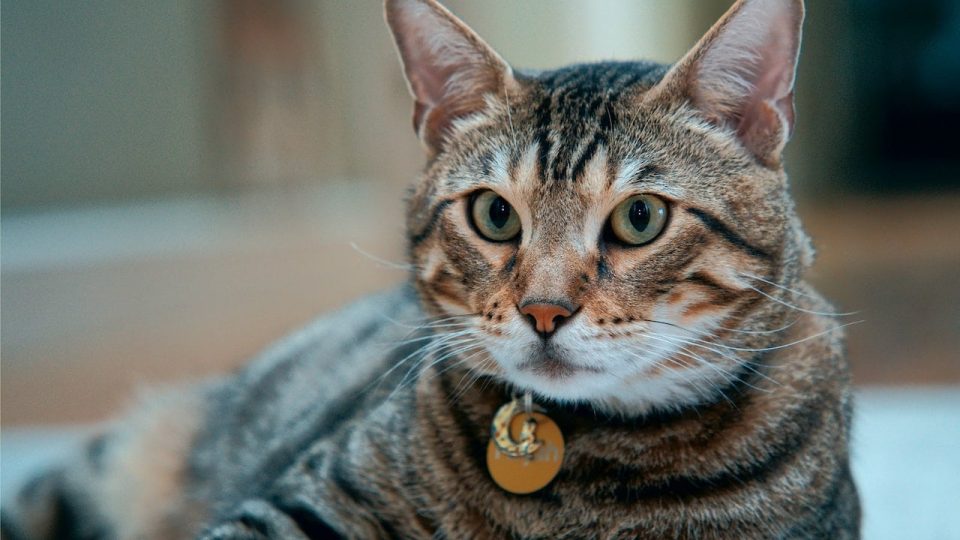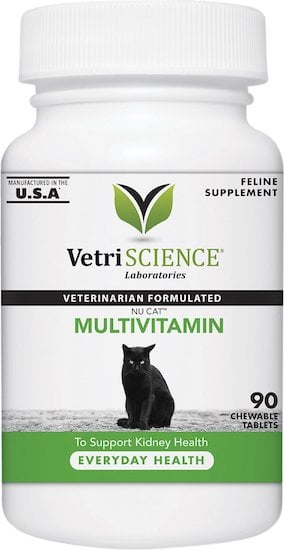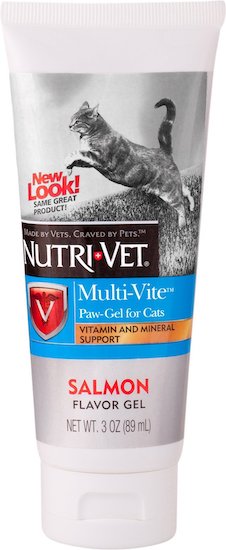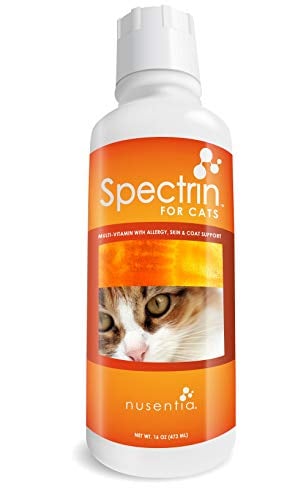- This post contains affiliate links. Read more here.
- Not a substitute for professional veterinary help.
Most of us take vitamins and supplements, and it may seem like it’s good insurance to get some vitamins for our cats. But it turns out that vitamins for cats are only needed in special situations.
“The key point is that most cats consuming a complete and balanced diet probably have a better-balanced diet than most humans,” says Dr. Sherry Sanderson of the University of Georgia College of Veterinary Medicine in this Fetch by WebMD article on vitamins for cats.
So if you are feeding your kitty a regular cat food diet, they are likely getting all the nutrients they need. Sanderson and other experts suggest going easy on supplements and, in particular, not giving multiple supplements as the ingredients may overlap result in too high a dosage. In fact, vets at the Cornell University College of Veterinary Medicine recommend that you never give your cat a supplement without checking with your veterinarian first.
But there are special instances when your kitten or cat could benefit from this type of dietary supplement. Your vet can tell you if your cat needs additional vitamins to help with a particular health condition, and they can tell you exactly which vitamin your kitty needs. (If your cat is very ill and not eating well, your vet may recommend a calorie supplement that includes vitamins.)
Your vet can also recommend vitamins specially formulated for cats or small animals. (Please don’t give your cat vitamins formulated for humans—as this PetMD article explains, that could lead to a dangerous overdose.)
How to Choose Vitamins for Cats
- Dr. Gary Richter, award-winning vet, and member of Rover’s Dog People Panel, offers these guidelines help you choose wisely when you buy supplements for your cat:
- Look for brands that have commissioned clinical studies of their products.
- Read labels carefully to ensure quality and safety.
- Look for a lot number on the product. This is a sign that the company uses quality control checks.
- Choose brands with confirmed expertise.
- Be wary of claims that sound too good to be true. Vitamin supplements are just that—supplements. They are not cure-alls or medications.
- Do not give human supplements to your cat, as they may contain ingredients that are harmful to cats.
- In general, the best options will be available through your veterinarian.
The bottom line about vitamins for cats: Talk to your vet first before adding one of them to your pet’s diet.
The Best Vitamins for Cats
Vitamins specially formulated for cats come in many forms, including tablets, powders, chews, gels, and liquids. You’ll notice that some brands focus on one or two key vitamins. Other brands have multivitamin formulas. A few are focused on the dietary needs of kittens or senior cats. When you buy, check the ingredients list carefully to make sure the supplement includes the vitamin or vitamins your cat needs for their particular health issues. The majority of these supplements are made in the U.S.; we’ve noted the exceptions.
VetriScience NuCat Multivitamin Everyday Health Chewable Tablets
Formulated to support your cat’s kidney health, this multivitamin delivers nutrients via a chewable tablet. It includes vitamins A, B12, D3, and E, along with minerals and amino acids.
Shop on ChewyTomlyn Felovite II Nutritional Gel Cat and Kitten Supplement
This lickable fish-flavored gel includes vitamins A, D, and E along with taurine, minerals, and calcium. It comes in a 2.5-ounce tube and is made in Canada.
Shop on ChewyNutri-Vet Multi-Vite Salmon Flavor Paw Gel for Cats
This gel offers vitamins A, B12, and D2, along with minerals, for adult cats. It comes in a 3-ounce tube; apply it to your cat’s paw and they’ll lick it off.
Shop on ChewyRx Vitamins Rx B12 for Dogs and Cats
Has your vet suggested vitamin B12? It’s often prescribed for cats suffering from irritable bowel syndrome or pancreatitis. This liquid is a simple formula of vitamin B12 (a man-made version called cyanocobalamin). You can give it to your cat using the included dropper.
Shop on ChewyPet Naturals of Vermont Daily Multi Cat Chews
If your cat is not excited about droppers or tablets, these chicken liver-flavored chews might be the way to get them to take their daily dose. This multivitamin, formulated for cats at all life stages, includes antioxidants, omega-6 fatty acids, minerals, and vitamins A, D, and B complex.
Shop on ChewyRx Vitamins Amino B-Plex Dog and Cat Supplement
This hypoallergenic liquid formula, intended to help pets debilitated by illness or surgery, contains concentrated B-complex vitamins, essential amino acids, potassium, and iron. It’s available in 2-ounce, 4-ounce, and 8-ounce bottles.
Shop on ChewySpectrin Liquid Vitamin and Antioxidant Supplement for Cats
This liquid multivitamin includes vitamins, essential fatty acids, antioxidants, and taurine in a formula specially designed for cats. Not all cats will take the liquid, but cat parents whose cats do take it sing this supplement’s praises—it’s worth reading their reviews.
Shop on AmazonRx Vitamins Rx D3 Dog and Cat Supplement
This liquid formula provides a boost of vitamin D3 in the form of cholecalciferol. Vitamin D3 can help cats that are having difficulty with calcium and phosphorus absorption, plus it helps support immune system health. It comes in a 2-ounce bottle.
Shop on ChewyNaturVet Kelp Help Vitamin and Mineral for Dogs and Cats
This powder takes a big-picture approach to supplementing your cat’s diet, with 60 essential minerals, vitamins, and amino acids. It’s formulated with Norwegian kelp, a rich source of trace minerals, and includes vitamins A, E, D3, and B12.
Shop on ChewyFurther Reading
- Cat Joint Supplements: Do They Really Work?
- Exploring Omega-3 for Cats: Can It Boost Your Kitty’s Health?
- The Healthiest Cat Food Options to Dish Out on a Budget
Featured image by Partha Narasimhan/Unsplash












